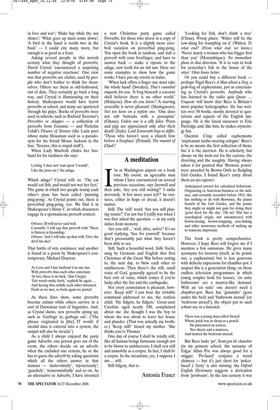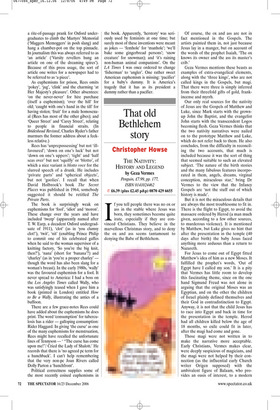A meditation
I’m at Washington airport on a book tour. My escort, an agreeable man whom I have encountered on several previous occasions, says farewell and then asks, ‘Are you still writing?’ I smile nervously. ‘A few more years left?’ he ventures, either in hope or dread, it doesn’t matter.
Still. The ‘still’ word. ‘Are you still playing tennis?’ I’m not but I (still) was when I was first asked the question — in my early sixties from memory.
‘Are you still ...’ well, alive, active? It’s no good replying, ‘See for yourself’ because that’s presumably just what they haven’t been able to see.
Still. Such a beautiful word. Stille Nacht, sung by Germans and English that first Christmas of the Great War before setting to, the next day, to blow each other to smithereens. Then there’s the still, small voice of God, generally agreed to be the best sort of voice, which comes if you’re lucky after the fire and the earthquake.
Not every connotation is pleasant, however. ‘Keep still!’ I can hear the irritable command addressed to me, the restless child. ‘He fidgets, he fidgets,’ Great-aunt Caroline aged nearly 100, complained about me: she thought I was the boy to whom she was about to leave her house and plunder. (That was actually my brother.) ‘Keep still!’ hissed my mother. ‘She thinks you’re Thomas.’ One day of course I shall be totally still, like all human beings fortunate enough not to be blown to smithereens. I shall rest still and immobile as a corpse. In fact, I shall be a corpse. In the meantime, yes, I suppose I am ... still.
Still fidgety, that is.
Antonia Fraser
‘Looking for fish, don’t climb a tree’ (China). Wrong plaice. ‘Wider will be the cow-dung for trampling on it’ (Wales). To what end? (From what end, we know.) ‘Never marry a woman who has bigger feet than you’ (Mozambique). No immediate plans in that direction. ‘It is in vain to look for yesterday’s fish in the house of the otter.’ Otter know better.
Or you could buy a different book perhaps Nigel Rees’s A Man about a Dog, a grab-bag of euphemisms, just as entertaining as Crystal’s proverbs. Anybody who has listened to the radio quiz Quote ... Unquote will know that Rees is Britain’s most popular lexicographer. He has written over 50 books, mostly devoted to quotations and aspects of the English language. He is the lineal successor to Eric Partridge and, like him, he makes etymology fun.
Quentin Crisp called euphemisms ‘unpleasant truths wearing cologne’. Rees’s is by no means the first collection of them, but it is the merriest. He is scholarly, but always on the look-out for the curious, the diverting and the naughty. Having always taken it for granted that ‘Brownie points’ were awarded by Brown Owls to fledgling Girl Guides, I found Rees’s entry about them an eye-opener:
Anticipated reward for calculated behaviour. Originating in American business or the military, and certainly recorded before 1963, this has nothing to do with Brownies, the junior branch of the Girl Guides, and the points they might or might not gain for doing their ‘good deed for the day’. Oh no! This has a scatological origin, not unconnected with brown-nosing, brown-tonguing, arse-licking and other unsavoury methods of sucking up to someone important.
The book is pretty comprehensive. However, I hope Rees will forgive me if I mention a few omissions. He gives many synonyms for lavatory (itself, as he points out, a euphemism) but is less generous with delicate expressons for chamber-pot. I suspect this is a generation thing: on those endless television programmes in which young couples look for houses, ‘en suite bathrooms’ are a mantra-like demand. With an ‘en suite’ one doesn’t need a chamber-pot. Rees has ‘gazunder’ (goes under the bed) and ‘bathroom utensil’ (or ‘bedroom utensil’), the object put to such robust use in a limerick:
There was a young man called Stencil Whose prick was as sharp as a pencil. He punctured an actress, Two sheets and a mattress, And dented the bedroom utensil.
But Rees lacks ‘po’, from pot de chambre (in my primary school, the surname of Edgar Allan Poe was always good for a snigger. ‘Po-faced’ conjures a weird chimera — but it’s just short for ‘pokerfaced’.) ‘Jerry’ is also missing: the Oxford English Dictionary suggests a derivation from ‘jeroboam’. In the last century it was a rite-of-passage prank for Oxford undergraduates to climb the Martyrs’ Memorial (‘Maggers Memoggers’ in posh slang) and hang a chamber-pot on the top pinnacle. In journalism this was always referred to as ‘an article’ (‘Varsity revellers hung an article on one of the dreaming spires’). Because of this press usage, the sort of article one writes for a newspaper had to be referred to as ‘a piece’.
As euphemisms for prison, Rees omits ‘pokey’, ‘jug’, ‘clink’ and the charming ‘at Her Majesty’s pleasure’. Other absentees: ‘on the never-never’ for hire purchase (itself a euphemism); ‘over the hill’ for old; ‘caught with one’s hand in the till’ for having stolen; ‘fruit’ for a male homosexual (Rees has most of the other gibes); and ‘Queer Street’ and ‘Carey Street’, relating to people in financial straits. (In Brideshead Revisted, Charles Ryder’s father murmurs the former address about a feckless relative.) Rees has ‘unprepossessing’ but not ‘illfavoured’; ‘down on one’s luck’ but not ‘down on one’s uppers’; ‘tight’ and ‘half seas over’ but not ‘squiffy’ or ‘blotto’, of which a nice variant is blotto voce for the slurred speech of a drunk. He includes ‘private parts’ and ‘spherical objects’, but not ‘goolies’. I recall that when David Holbrook’s book The Secret Places was published in 1964, somebody suggested it should be retitled The Private Parts.
The book is surprisingly weak on euphemisms for ‘fool’, ‘idiot’ and ‘moron’. These change over the years and have included ‘twerp’ (apparently named after T. W. Earp, a decadent Oxford undergraduate of 1911), ‘clot’ (as in ‘you clumsy clot!’), ‘twit’, ‘nit’ (enabling Prince Philip to commit one of his celebrated gaffes when he said to the woman supervisor of a knitting factory, ‘So you’re the big knit, then?’), ‘nana’ (short for ‘banana’?) and ‘charley’ (as in ‘you’re a proper charley’ though the word has also been slang for a woman’s breast). In the early 1980s, ‘wally’ was the favoured euphemism for a fool. It never spread to America: I had a boss on the Los Angeles Times called Wally, who was satisfyingly teased when I gave him a book (printed in London) entitled How to Be a Wally, illustrating the antics of a buffoon.
There are a few grace-notes Rees could have added about the euphemisms he does print. The word ‘consumption’ for tuberculosis has a rider — galloping consumption: Rider Haggard. In giving ‘the curse’ as one of the many euphemisms for menstruation, Rees might have recalled the unfortunate lines of Tennyson — ‘ “The curse has come upon me!”/ Cried the Lady of Shalott.’ He records that there is ‘no agreed pc term for a hunchback’. I can’t help remembering that the very non-pc Joan Rivers called Dolly Parton a ‘hunchfront’.
Political correctness supplies some of the most recently coined euphemisms in the book. Apparently, ‘herstory’ was seriously used by feminists at one time; but surely most of these inventions were meant as jokes — ‘femhole’ for ‘manhole’; ‘we’ll bake some gingerbread persons’; ‘snow creature’ for snowman); and ‘it’s raining non-human animal companions’. On the LA Times I was once ordered to change ‘fisherman’ to ‘angler’. One rather sweet American euphemism is missing: ‘pacifier’ for a baby’s dummy. It is America’s tragedy that it has as its president a dummy rather than a pacifier.







































































































































 Previous page
Previous page